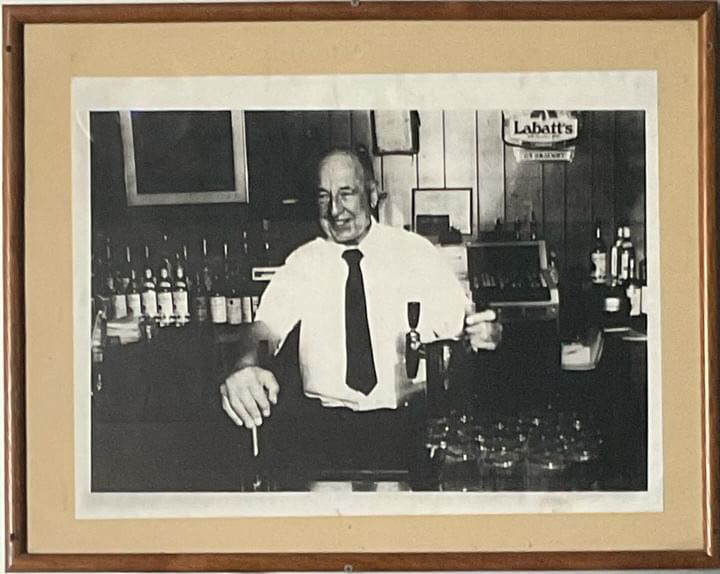Once upon a time, sports bars didnÔÇÖt exist. Certainly people gathered at 19th-century bars, and inevitably sports were discussed, sometimes hotly. Today, the modern sports bar is ubiquitous, with its giant flat screens and autographed jerseys covering every surface.
Somewhere between these two, the murky origins of the sports bar might very easily be traced to one of these beloved Detroit baseball bars.
Lindell AC
The legendary ÔÇö which opened in 1949 at Cass and Bagley and moved to Cass and Michigan in 1963 ÔÇö is still remembered fondly by many longtime Detroiters. Former regulars still laugh about the antics of the barÔÇÖs owners, brothers John and Jimmy Butsicaris, and the drunken shenanigans of sports figures who visited the bar long ago.
Any time you mix athletes, journalists, and booze, youÔÇÖre likely to get a crackerjack night. This combustible combination was possible because so many visiting athletes stayed at the nearby Leland and Book-Cadillac hotels. Players like Mickey Mantle and Alex Karras became regulars at this hole-in-the-wall bar, dropping in usually after but sometimes before their exploits on the playing field.
Sometime in the 1950s, baseball player and manager Billy Martin, a frequent barstool warmer at the Lindell, supposedly told the owners that the place looked like a dump and recommended they cover the dingy walls with some sports memorabilia to disguise the shabby surroundings. And so they did. Later, legendary Detroit sports writer Doc Greene inspired the addition of ÔÇśACÔÇÖ to the name, a dig to the tony Detroit Athletic Club a few blocks away.
The Lindell closed in 2002 but has lived on in fond memory for many. In 2019, the Detroit Historical Museum commemorated the famed watering hole with a replica ÔÇťNight at the Lindell ACÔÇŁ event, which celebrated the opening of an exhibit about the bar. In a 2017 documentary, , former cook Terry Foster had this to say about the Lindell:
ÔÇťIt was old and stinky and the chairs kind of creaked and nothing worked, but it was the place to be because it was like a movie theater. Maybe it was Stella [John ButsicarisÔÇÖs wife] yelling at somebody as she was cooking. Maybe it was Jimmy threatening to break somebodyÔÇÖs arms if they werenÔÇÖt acting right. Maybe it was Johnny cracking jokes and trying to steal kisses from the waitresses. It was just fun to go there and be part of the scene.ÔÇŁ

Hoot RobinsonÔÇÖs
William ÔÇťHootÔÇŁ Robinson was an ordinary Detroit barman who was also an avid baseball fan. He opened his first joint at Michigan and Trumbull in 1936 in the Checker Cab building, with a view right across Trumbull to Briggs Stadium.
While he was serving up drinks in the Checker Cab building, reportedly Babe Ruth visited and at least one Tigers pitcher insisted on a beer and a hot meal before games.
Robinson moved his popular bar right next door, to the former Tiger Cocktail Bar, in the 1950s. The crowd on opening day in 1984 must have known something special was coming that year (the Tigers would win the World Series in the fall): Fans started lining up at the bar well before noon, and the crowd spilled into the streets all day.
closed in 1994, just a few months before RobinsonÔÇÖs death, and the building remained shuttered for 20 years. Thankfully, the now occupies the space, and fans can still grab a beer and a hot dog for old timesÔÇÖ sake.

▒Ě▒│ż┤ăÔÇÖs
might not have been around in the 1930s or even the ÔÇÖ50s, but the 19th-century building on Michigan Avenue just a block from old Tiger Stadium holds plenty of baseball memories for several generations of Detroiters. First opened in 1965 by the Springstead brothers, Pat and Tim, ▒Ě▒│ż┤ăÔÇÖs is still going strong nearly 60 years later.
One former batboy recalls making good tip money from Tigers players by running down to ▒Ě▒│ż┤ăÔÇÖs midgame for burgers ÔÇö and maybe a beer or two.
A 1979 Detroit Free Press article declared HootÔÇÖs, ▒Ě▒│ż┤ăÔÇÖs, MaryÔÇÖs Bengal Bar, and other Corktown sports bars like the Lager House to be ÔÇťof utmost significance when sleet threatens to mix with strike outs and sliders.ÔÇŁ These beloved Corktown sports bars were ÔÇťblessedly free of the shiny, plastic feel of the typical toney suburban tavern.ÔÇŁ
Thankfully, enough bars remain what that 1979 Free Press article dubbed ÔÇťhang-loose joints where you can concentrate on the basics: baseball, beer and burgers.ÔÇŁ Stadiums may move, sports bars may change locations, but these baseball classics remain.
This story originally appeared in the April 2024 issue of ║┌┴¤═° Detroit magazine. To read more, pick up a copy of ║┌┴¤═° Detroit at a local retail outlet. Our╠řdigital edition╠řwill be available on April 5.
|
| ╠ř |
|








